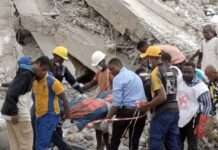
After initially testing the waters with the approved resumption of students in exit classes on 4 August, the federal government eventually gave approval for the reopening of schools and other learning facilities in the country. This was after shutting down educational institutions across the country earlier in March to curb the spread of the COVID-19 pandemic.
Announcing the reopening during a briefing on 3 September, the National Coordinator of the Presidential Task Force on COVID-19, Dr Sani Aliyu, said the task force had recommended phased return of students. Speaking at the Nnamdi Azikwe International Airport, Abuja, Aliyu also said, “However, we strongly recommend that states conduct a risk assessment to ensure all schools are at a level of compliance and create a monitoring mechanism to assess, create, and monitor this level of preparedness.”
The government also gave comprehensive guidelines on such reopening to ensure the protection of learners, teachers, education personnel and their families, as well as to restore pre-pandemic capacities. Since then, many of such institutions of learning have reopened across the country and educational activities have resumed in earnest.
While it would appear that this audacious decision by the government was predicated on the dwindling figures of new COVID-19 infections in the country, we believe that there is a more serious justification that borders on safeguarding the future of these young minds, and the nation as a whole. Indeed, while calls from medical experts and other concerned individuals and groups against the announced reopening seemed germane – considering that the coronavirus is still very much on rampage – it must be emphasised that the prolonged stay at home was beginning to cause some other severe harms to the children, their families and their tutors.
Several reports have confirmed that within the period of the school closure, there was an alarming upsurge in juvenile delinquencies, sexual exploitation of girls and young women, teenage pregnancies, early marriages, and child labour. Parents were also having an excruciating time coping with the excesses and risky behaviours that naturally ensue from the unfettered exuberance of their youngsters.
It was in consideration of these factors that both the World Health Organisation (WHO) and the United Child Nations Children’s Fund (UNICEF) jointly expressed support for the reopening of schools. Dr Matshidiso Moeti, WHO Regional Director for Africa, said: “We must not be blind-sided by our efforts to contain COVID-19 and end up with a lost generation.” Similarly, UNICEF Regional Director for Eastern and Southern Africa, Mohamed M. Malick Fall, warned: “The long-term impact of extending the school shutdown risks ever greater harm to children, their future and their communities.”
It is necessary to emphasise, however, that now that the majority of the scholars are back to their classes, all stakeholders in the educational sector must bear in mind that the reopening of schools is not a better alternative but a lesser of two evils. As reports continue to show, the virus that causes COVID-19 is still a major threat in the country. Therefore, efforts must be taken by the government and education authorities across the country to ensure strict compliance with the guidelines stipulated for the reopening.
Achieving this compliance will require enlisting the support of school managements, parents and the students themselves. It will also involve an integrated approach, comprising critical components such as continued sensitisation and monitoring to ensure that schools do not breach necessary safety rules for any reason. These rules include physical distancing measures, such as staggering the beginning and end of the school day, cancelling school events that create crowding, and spacing desks; providing hand washing facilities; enforcing wearing of masks; discouraging unnecessary touching; and ensuring that sick students and teachers stay at home.
It is our view that enforcing and monitoring compliance with these guidelines will guarantee safe teaching and learning amidst the coronavirus challenge. As Mr Boss Mustapha, Secretary to the Government of the Federation (SGF) and Chairman, Presidential Task Force (PTF) on COVID-19, recently warned, government at all levels and other stakeholders in the education sector must be guided by experiences from countries such as Germany, France, the United States, and the UK where the opening of schools in some cities led to an increase in confirmed cases and fatalities. All hands must be on deck to ensure that no state or community in Nigeria suffers the same fate.














tadalafil pills – tadalafil dosage buy generic tadalafil online